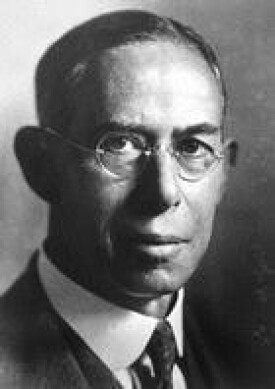厄蘭格
厄蘭格
約瑟夫·厄蘭格 (1874年1月5日—1965年12月5日)美國生理學家,和加塞(Herbert Spencer Gasser,July 5, 1888——May 11th, 1963)共同研究神經纖維的電學性能。他們應用布勞恩的示波器來放大所檢測的電流這種方法測出,不同的神經纖維是以不同的速度來傳導衝動,傳導的速度與纖維的粗細成正比。並因此,兩人共同獲得1944年的諾貝爾生理學或醫學獎。
Joseph Erlanger (1874年1月5日—1965年12月5日)
美國生理學家,1874年1月5日生於加利福尼亞州舊金山;1965年12月5日卒於密蘇里州聖路易斯。厄蘭格於1895年在加利福尼亞大學畢業,主修化學。以後他在約翰斯·霍普金斯大學繼續學習,於1899年取得該校醫學學位。1900年他進入約翰斯·霍普金斯大學生理教研室,以後他又到威斯康星大學新建的醫學院任生理系主任。加塞即是他的學生之一。最後在1910年任聖路易華盛頓大學生理系主任,(直到1948年他退休時一直任此職)。加塞在此與他協作。二十年代他們研究神經纖維的電學性能,他們得出了非常精確的數據。他們並未採用艾因托文所應用高敏感度的示波器,而是應用布勞恩的示波器來放大所檢測的電流取得的。他們應用這種方法測出,不同的神經纖維是以不同的速度來傳導衝動,傳導的速度與纖維的粗細成正比。由於這項研究厄蘭格和加塞(Herbert Spencer Gasser,July 5, 1888——May 11th, 1963)共同獲得1944年諾貝爾生理學或醫學獎。
Joseph Erlanger was born on January 5, 1874, at San Francisco, California. He is the son of Herman and Sarah Erlanger.
Studying chemistry at the University of California, he received the degree of B.S. of that University and later went to Johns Hopkins University to study medicine, where he obtained his M.D. degree in 1899. After a year of hospital training at the Johns Hopkins Hospital, he was appointed assistant in the Department of Physiology at the Medical School there. Until 1906 he stayed there, being successively Instructor, Associate, and Associate Professor. He was then appointed the first Professor of Physiology in the newly established Medical School of the University of Wisconsin, where one of his pupils was H. S. Gasser, who later collaborated with him. In 1910 he was appointed Professor of Physiology in the reorganized Medical School of the Washington University, St. Louis. In 1946 he retired as chairman of this school and is now emeritus professor there.
Erlanger's chief research has been done in the fields of electrophysiology and the physiology of the circulatory system. He has studied the principles of sphygmomanometry and devised a recording sphygmomanometer, with which he studied, in man, the influence of pulse pressure on kidney secretion and on orthostatic albuminuria. Later, he devised a clamp with which the auriculo-ventricular bundle of the mammalian heart could be reversibly blocked, and with this device he studied the problems associated with the functions of this bundle.
In 1922, in collaboration with Gasser, Erlanger adapted the cathode-ray oscillograph for the study of nerve action potentials and this led to the work for which Erlanger and Gasser were given the Nobel Prize for Medicine or Physiology in 1944. Erlanger has also worked on metabolism of dogs with shortened intestines, on traumatic shock and on the mechanism of the production of sound in arteries.
Erlanger has received honorary doctorates of the Universities of California, Wisconsin, Pennsylvania, and Michigan.
In 1906, he married Aimée Hirstel, who died in 1959. They had three children, Margaret (b. 1908), Ruth Josephine (b. 1910), Herman (1912-1959).
From Nobel Lectures, Physiology or Medicine 1942-1962, Elsevier Publishing Company, Amsterdam, 1964
This autobiography/biography was first published in the book series Les Prix Nobel. It was later edited and republished in Nobel Lectures. To cite this document, always state the source as shown above.
Joseph Erlanger died on December 5, 1965.
